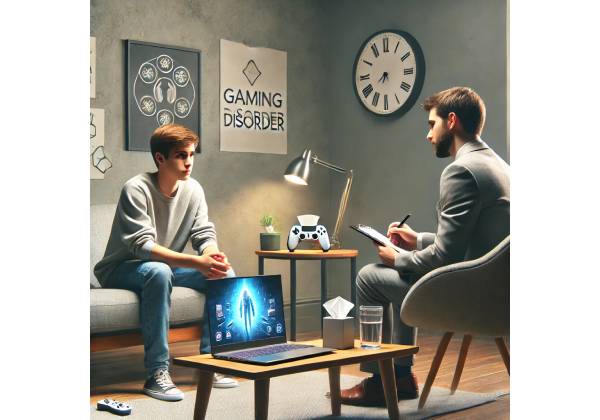
The glow of a screen, the thrum of a headset, and a quick “One more match!”—for most players, video games are a harmless escape. Yet for a growing minority, the controller becomes a lifeline they can’t set down, homework and hygiene fade into side quests, and dopamine hits replace real-world rewards. Gaming disorder—officially recognized by the World Health Organization—describes a pattern of play so persistent and compulsive that it crowds out sleep, relationships, and mental health. This in-depth guide explores how an ordinary hobby mutates into dependence, the red flags parents and partners can’t ignore, and the multifaceted strategies that help gamers log out and reboot life.
Table of Contents
- Global Trends and How Many Players Are at Risk
- Under the Hood: Neurobiology, Personal Vulnerability, and Market Forces
- Spotting Trouble: Clinical Criteria, Behavioral Cues, and Self-Tests
- Fallout for Body, Mind, and Social Worlds
- Pathways to Recovery: Evidence-Based Therapies, Tools, and Lifestyle Reset
- Frequently Asked Questions
Global Trends and How Many Players Are at Risk
A meteoric market
Worldwide gaming revenue already tops the movie and music industries combined, surpassing \$200 billion annually. Mobile titles bring AAA graphics into pockets, while cloud services stream high-end play to budget laptops. Esports arenas sell out faster than many rock concerts, and influencer streamers pull millions of viewers nightly.
Prevalence snapshots
- Overall gamers: Roughly 3.3 billion people—over 40 % of humanity—play at least occasionally.
- At-risk players: Meta-analyses place probable gaming disorder between 2 % and 5 % of adults and up to 9 % of adolescents. Rates climb higher in competitive multiplayer titles that blend social prestige, loot boxes, and endless “season passes.”
- Demographic notes: Historically male-dominated, but female representation has surged on mobile and casual platforms; gender gaps in addiction rates are narrowing. Average age of first smartphone game has dropped below eight years old in many countries.
Cultural context
- Pandemic accelerant: Lockdowns pushed hours online by 70 % in 2020, normalizing marathon sessions.
- Gamification of everything: Work apps, fitness trackers, and online education all borrow level-up mechanics, blurring lines between productivity and play.
- Cross-platform ecosystems: Players switch seamlessly from console to phone to VR headset, extending engagement windows and complicating detox efforts.
The takeaway —gaming disorder is uncommon but far from rare, and its reach spans socio-economic lines, age brackets, and continents.
Under the Hood: Neurobiology, Personal Vulnerability, and Market Forces
Brain circuitry and chemical hooks
- Dopamine release: Rapid success (headshots, rare drops) triggers dopamine bursts in the nucleus accumbens—the same reward center lit up by gambling and cocaine.
- Variable-ratio reinforcement: Random loot, critical hits, and matchmaking ranks mirror slot-machine payout schedules, hard-wiring the “just one more” loop.
- Prefrontal cortex lag: In teens, impulse control regions mature years after reward circuitry, making them extra-susceptible to prolonged play.
- Allostatic load: Long sessions reset the brain’s reward baseline, so offline life feels under-stimulating, nudging return to the console.
Psychological risk factors
| Risk Amplifier | Why It Fuels Excess Play | Practical Guardrail |
|---|---|---|
| Social anxiety | In-game chat feels safer than face-to-face | Structured offline social skills training |
| ADHD traits | Constant novelty & instant feedback soothe boredom | Pomodoro timers, physical micro-breaks |
| Depression | Games offer escapism & guaranteed goals | Therapy + outdoor activity scheduling |
| Perfectionism | Ranked ladders promise measurable mastery | Celebrate non-game achievements, diversify identity |
Environmental and industry levers
- Free-to-play monetization: 0-dollar entry widens funnel; micro-transactions reward whales who spend big to stay competitive.
- Live-service design: Daily quests, login streaks, seasonal FOMO encourage continuous engagement.
- Streamer culture: Parasocial bonds with influencers normalize 8-hour daily grinds.
- Loot boxes & skins: Gambling-like mechanics, sometimes accessible to minors, add financial risk and elevated excitement.
Knowing the interplay of brain, personality, and business design converts shame (“I lack willpower”) into strategic self-defense (“I’m up against billion-dollar psychology engines”).
Spotting Trouble: Clinical Criteria, Behavioral Cues, and Self-Tests
WHO diagnostic essentials
- Impaired control over gaming: difficulty limiting onset, frequency, intensity, or duration.
- Priority given to games over other interests and responsibilities.
- Continuation despite negative consequences in personal, family, social, academic, or occupational domains.
- Timeframe: Behavior persists for 12 months (shorter if damage is severe).
Behavioral red flags
- Tunnel scheduling: Meals skipped, alarms snoozed, hygiene neglected to push rank.
- Mood swings tied to game outcomes: Euphoric after wins, irritable when servers crash.
- Secret play: Deleting logs, minimizing windows when someone enters room.
- Financial strain: Unexpected in-app purchases, credit-card charges for skins, in-game currencies.
- Withdrawal-like signs: Restlessness, cravings, intrusive game thoughts when offline.
- Progressive tolerance: Need for longer sessions or harder modes to feel satisfaction.
Self-screening tools
- IGDS9-SF (Internet Gaming Disorder Scale–Short Form): Nine yes/no items map to DSM-5 criteria.
- Problematic Online Gaming Questionnaire: Assesses compulsion, neglect, euphoria, tolerance, withdrawal.
- 24-hour activity log: Color-code school/work, sleep, gaming; visual patterns reveal imbalance.
- Body-signal check-in: Track posture pain, eye strain, and headaches during session peaks.
Early identification opens doors to gentle course correction before crisis strikes.
Fallout for Body, Mind, and Social Worlds
Physiological toll
- Sleep deprivation: Blue-light exposure past midnight suppresses melatonin, derailing circadian rhythms.
- Sedentary strain: Forward-head posture, carpal-tunnel symptoms, and lower-back pain common in marathon players.
- Metabolic risk: Sugary energy drinks and snack grazing elevate weight, insulin resistance, and cardiovascular markers.
- Vision issues: Digital eye strain causes blurred sight and headaches; unblinking focus reduces tear film, leading to dryness.
- Seizure triggers: Rare cases of photosensitive epilepsy in fast-flash settings.
Psychological and relational impact
| Area | Typical Consequences |
|---|---|
| Mood | Heightened anxiety, depressive episodes after all-night sessions, emotional numbness |
| Cognition | Executive-function deficits: reduced attention span, task-switching sluggishness |
| Academic/work | Missed deadlines, tardiness, declining grades, workplace warnings |
| Family | Conflict over screen rules, neglect of chores, isolation from siblings or partner |
| Social life | Loss of offline friendships, reliance on virtual clans, difficulty reading real-world cues |
| Finances | Micro-transaction debt, expensive gear upgrades, lost income from missed shifts |
Comorbid concerns
- Substance overlap: Energy drinks, caffeine pills, or cannabis used to extend or recover from sessions.
- Eating disorders: Skipped meals replace hunger cues; binge-eating during cues screens occurs elsewhere.
- Self-harm risk: In some reports, in-game failures precipitate suicidal ideation in vulnerable teens.
Comprehensive recovery plans tackle these intertwined threads, not just screen hours.
Pathways to Recovery: Evidence-Based Therapies, Tools, and Lifestyle Reset
1. Digital harm reduction
- Screen-time apps: iOS Screen Time, Android Digital Wellbeing track hours; set App Limits to auto-lock at quotas.
- Grayscale mode after 9 p.m.: Removes color cues, dampening dopamine.
- Router scheduling: Parents can disable Wi-Fi to consoles overnight; adults can set timers for self-accountability.
- Game-free bedrooms: Designate sleep zone; keep consoles and rigs in common areas only.
2. Cognitive-Behavioral Therapy for Gaming (CBT-G)
- Trigger mapping: Identify mood or context that precedes binges (e.g., boredom after school).
- Thought restructuring: Challenge beliefs—“If I stop playing, I’ll lose friends”—replace with balanced alternatives.
- Behavioral activation: Schedule offline reward activities at typical craving windows.
- Skills training: Time-management, assertive refusal of peer pressures, stress-coping without screens.
3. Family-based interventions
- Parent training: Consistent rules, positive reinforcement, collaborative problem solving.
- Shared activities: Board-game nights, outdoor hikes rebuild bonds and provide dopamine via novelty.
- Tech contracts: Mutually agreed device limits, signed by all household members.
4. Group and peer models
- Game Quitters or Olganon forums: Online communities (ironically) provide social support and success stories.
- 12-step style meetings: Computer Gaming Addicts Anonymous (CGAA) offers sponsorship and abstinence frameworks.
- Esports athlete workshops: For competitive gamers, sports psychologists teach healthy practice schedules, physical conditioning, and mental reset routines.
5. Pharmacological adjuncts (case-by-case)
| Medication | Target Issue | Evidence Note |
|---|---|---|
| SSRIs | Depression, anxiety co-occurring with heavy play | Some studies show reduced gaming urge when mood stabilizes |
| Stimulants (ADHD meds) | Untreated ADHD fueling screen seeking | Proper dosing improves focus on school/work tasks |
| N-acetylcysteine (NAC) | Craving modulation via glutamate regulation | Early research promising but not conclusive |
Medication is supplemental—therapy and behavioral change remain core.
6. Lifestyle reboot
| Domain | Quick Wins | Long-Term Habits |
|---|---|---|
| Sleep | Tech curfew 60 min before bed; red-light bulbs | Regular bedtime, sunlight exposure at wake-up |
| Nutrition | Prep high-protein snacks reachable without leaving desk | Full balanced meals away from screens |
| Movement | 5-minute stretch every match; wrist curls | 150 min weekly cardio + strength program |
| Mindfulness | 3-breath pause before queueing next game | Daily 10-minute meditation practice |
| Identity diversification | Join one offline club (music, sport) | Volunteer or part-time job building real-world skills |
7. Relapse prevention
- Cue awareness: Recognize exam stress or break-up periods as high-risk windows.
- Emergency plan: Text accountability buddy, step outside for five minutes, drink water.
- Progress tracking: Celebrate streaks of balanced play (≤ 2 h/day) or game-free days.
- Flexible mindset: Lapses ≠ failure. Analyze triggers, adjust boundaries, resume plan.
Recovery is a marathon—each intentional log-off re-trains the brain toward healthier horizons.
Frequently Asked Questions
Is all heavy gaming bad, or only if it causes harm?
High hours alone aren’t diagnostic. It becomes a disorder when playing overrides health, responsibilities, or relationships and the person can’t cut back despite wanting to.
Can mobile games be addictive like MMOs?
Yes. Free-to-play mobile titles use notifications, energy timers, and random rewards to hook players, sometimes more effectively than PC or console games.
How long does it take to break the habit?
Physical urgency eases in two to four weeks once limits are imposed, but psychological cravings may surface for months. Ongoing coping skills keep them manageable.
Should parents ban games entirely?
Cold-turkey bans can backfire, spurring secrecy or rebellion. Gradual reduction plus engaging offline alternatives usually works better.
Does VR pose higher addiction risk?
Immersive presence and body tracking amplify reward feedback and escapism, so VR can intensify existing vulnerability, especially in isolating titles.
Can someone return to moderate gaming after recovery?
Many do successfully by sticking to pre-set rules (time blocks, genre limits). Those with severe addiction sometimes choose lifelong abstinence—personal experimentation and support guide the decision.
The information in this article is for educational purposes only and is not a substitute for professional medical or psychological advice. If you suspect gaming disorder, consult a qualified health professional.
Found this helpful? Share on Facebook, repost on X, or pass it to a friend leveling up their real-life health. Your support powers more practical, compassionate guides—thank you!










